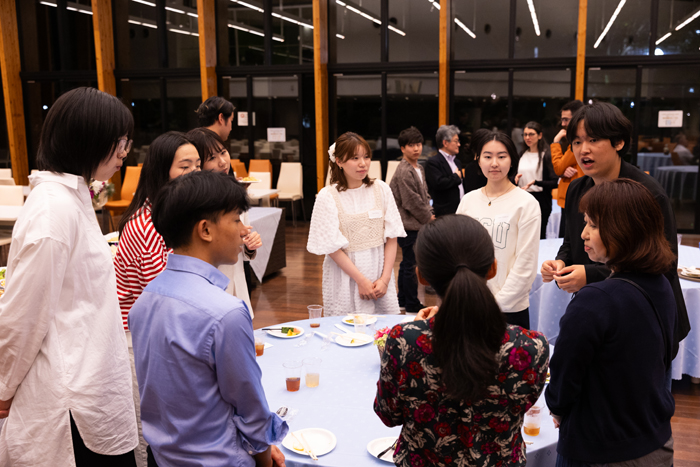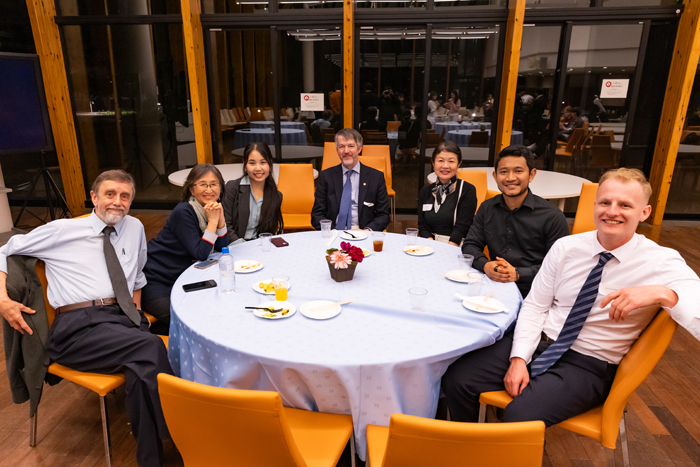JICUF Co-hosts Events on Refugee Higher Education with Wilfrid Laurier University
JICUF co-hosted a series of events with Canada’s Wilfrid Laurier University and Pathways Japan in late April. Wilfrid Laurier University, Pathways Japan, and JICUF have a shared commitment to expanding higher education opportunities for students displaced from their homes due to conflict.
“Roundtable on Education Pathways for Burmese and Rohingya Refugees in Japan” at the University of Tokyo, April 24
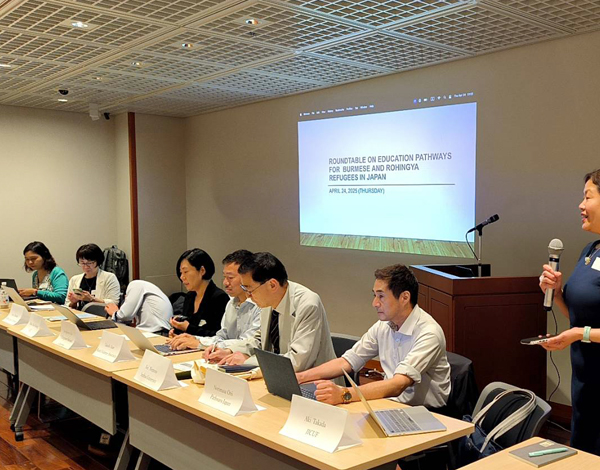
On Thursday, April 24, the three organizations co-hosted a “Roundtable on Education Pathways for Burmese and Rohingya Refugees in Japan” at the University of Tokyo. This was a closed meeting for practitioners and students with a strong interest in the refugee situation in Myanmar. Over 40 people from universities, non-profit organizations, international organizations and corporations attended to learn about the latest situation of the two refugee populations, the former in the Thai/Myanmar border area and the latter in Bangladesh. Sophia University Professor Emeritus Kei Nemoto, who is an ICU alumnus and has taught at ICU for a long time, gave an overview of the political, social and humanitarian situation in Myanmar. Participants also heard directly from UNHCR staff in Bangladesh and Takashi Kase of the Japanese NPO Shanti Volunteer Association, active in the Thai/Myanmar border region. Third year ICU student Maran Naw Hkawng shared his extraordinary journey from an IDP (Internally Displaced People) camp in Myanmar to ICU, which left a deep impression on the audience. Obstacles to accessing higher education, such as overcrowded teaching centers, the lack of accreditation of these facilities, shortage of teachers and supplies, and the students’ lack of legal documentation were highlighted. In addition, for Rohingya refugees, gender imbalance was a serious issue.
A reception was held in the evening, where participants continued their discussions and deepened their understanding. It was a unique opportunity for people involved with Burmese and Rohingya refugees to meet and expand their networks. For the co-hosts, the day was especially meaningful as we consider expanding educational opportunities for refugees in Myanmar. We would like to thank the University of Tokyo’s International Strategic Planning Office for providing the venue and logistical assistance.
“Supporting Students from Conflict Zones Through Higher Education in Canada”: Presentation by Wilfrid Laurier University’s International Students Overcoming War (ISOW) Initiative at ICU, April 25
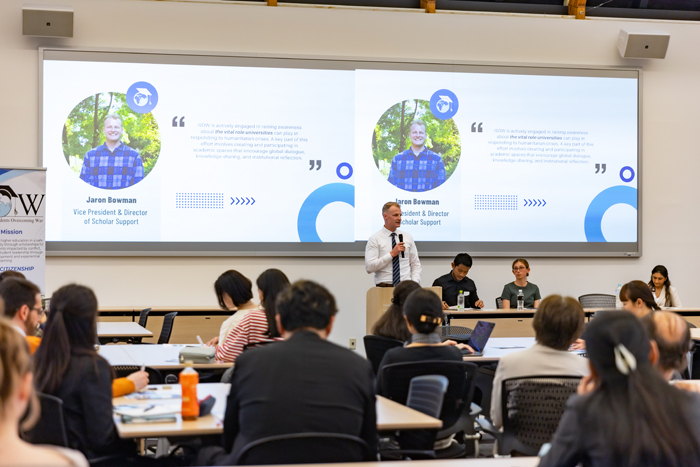
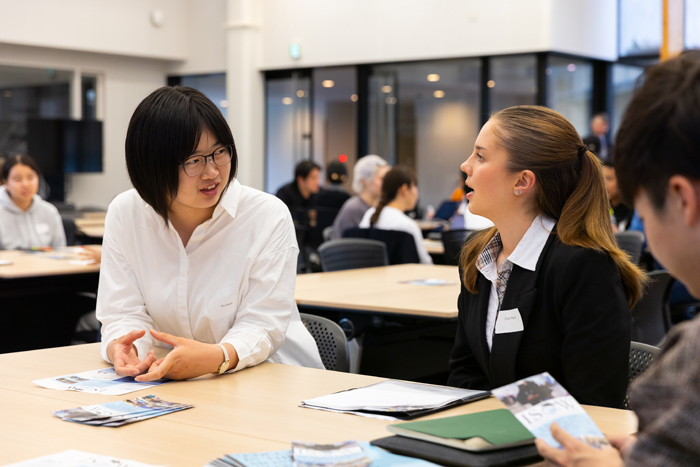
Professor Gavin Brockett, faculty advisor of Wilfrid Laurier University’s International Students Overcoming War (ISOW) initiative, brought two program assistants and eight student members to Japan. This student-led and student-funded initiative which began in 2014 has sponsored 43 refugee scholars from nine countries at the university. It empowers students to manage all aspects of the scholarship including the selection and post-arrival support of scholars, government advocacy, communication and financing. Through a referendum, Wilfrid Laurier students have continuously voted to pay a small levy (currently 8 Canadian dollars) every term to cover 50% of the cost of scholarships. The initiative not only benefits the refugee scholars who are sponsored, but also the student executives by providing them leadership opportunities and skills training.
On April 25, the eight ISOW students took turns to introduce each of their roles on the team to an audience of about 60 people at ICU. The participants included many ICU students as well as students from other universities including Sophia, Waseda, Keio, and Chungnam National University (CNU) in Korea. Professor Jeonghyeon Kim of CNU brought four of her students to join the series of events.
A reception in the university cafeteria followed the presentation, where ICU President Shoichiro Iwakiri and Professor Brockett made welcoming remarks. The diverse group of students enjoyed getting to know each other. We are grateful to ICU for providing the venue for the events on Friday and Saturday.
“Unified Action for a Global Change: Empowering Student-led Solutions for the Human Right to Education,” Student Workshop at ICU, April 26
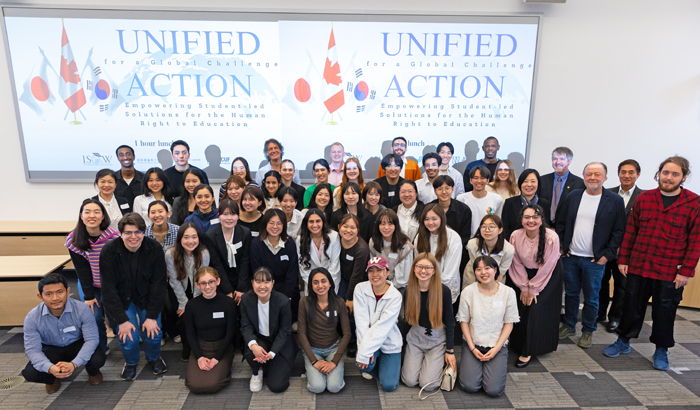
The following day, the ISOW team led a one-day workshop for students on taking action to expand higher education access for youth in conflict zones. The two events on April 25 and 26 were designed and implemented by an intercollegiate student planning committee with members from ISOW, ICU, CNU, Sophia University and Waseda University.
The workshop began with a panel discussion facilitated by third year ICU student Hana Okayasu on “Understanding the Need for University Engagement.” Prof. Brockett, Prof. Kim, and Representative Director Norimasa Orii of Pathways Japan provided the historical background of refugee admission in their respective countries, and together with JICUF Vice President Aki Takada, shared their thoughts on why universities had the responsibility to address humanitarian issues. Prof. Brockett described universities as “small cities” with essential services such as accommodation, health care, food and visa offices, which were well-equipped to handle the challenges of refugee admission. He stressed that universities had a social responsibility, and students had to hold them accountable. Mr. Orii concurred that universities were in fact the best entry point for refugees.
Next, Prof. Brockett interviewed special guest Mr. Enrique Piñeyro, founder of the NGO Solidaire. Mr. Piñeyro is a multi-talented humanitarian who is also a filmmaker, pilot, doctor and actor. Solidaire is a self-funded NGO that delivers emergency humanitarian aid to conflict areas such as Gaza, Ukraine and Sudan, and rescues people using two aircrafts and a ship in the Mediterranean. The organization has completed 49 missions and helped move more than 3,000 people from conflict areas to safety. He appealed to students not to tolerate what is unacceptable, and to be accountable to their six-year-old selves who had a clear sense of what was right.
In the afternoon, the 50 or so student participants broke out into small groups for three interactive sessions: “What are we going to do?”, “Making the Case for Universities and Humanitarian Action” and “Action Planning.” The students came from Wilfrid Laurier University, Chungnam National University, ICU, Sophia University, Waseda University, the University of Tokyo, Tokyo University of Foreign Studies, Kanagawa University and Ashikaga University, including some with refugee backgrounds from Myanmar, Syria and Ukraine. They spent four hours discussing the challenges and possible solutions for humanitarian issues, and identifying the concrete steps each could take.
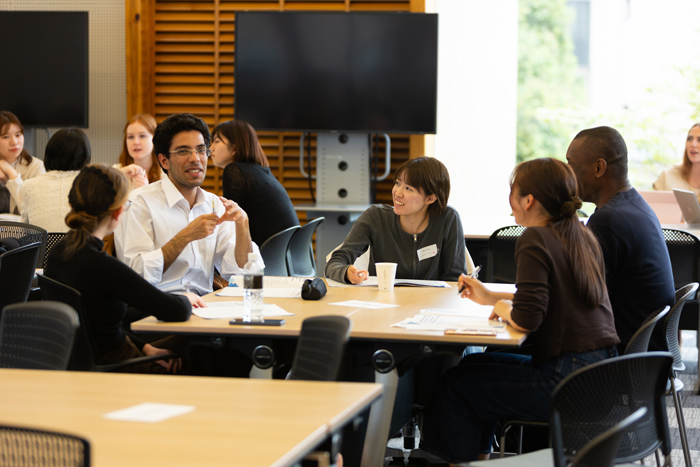

According to a post-event student survey, 100% of respondents said that they were “very satisfied” with both the Friday and Saturday events, and many remarked that they were thrilled to learn about student action in Canada and other countries, and network with peers with diverse backgrounds.
It was a pleasure for JICUF to support these three events which brought together people with a common interest, stimulated a lively exchange of ideas, and fostered new friendships. Convenings that promote our core values of justice, equity and freedom, and encourage collaboration across organizations and national borders are a key strategy for JICUF to advance our mission of nurturing global citizenship.

